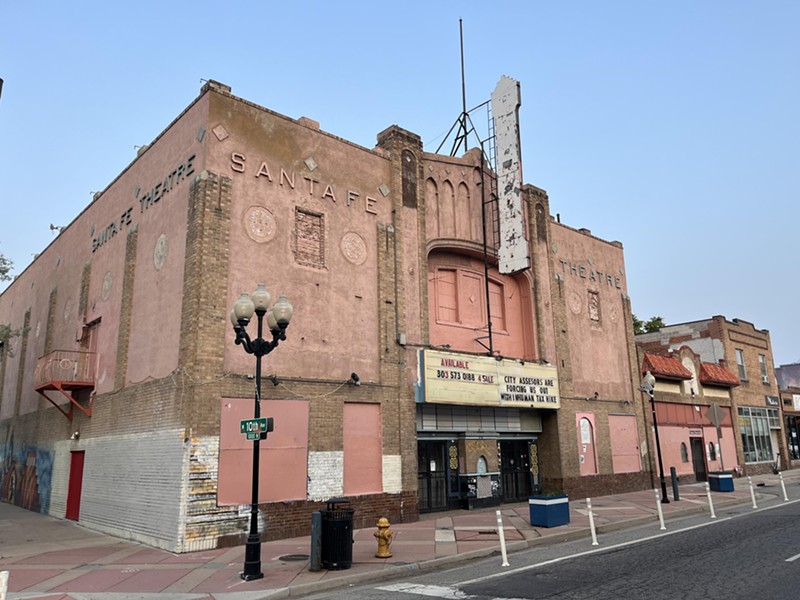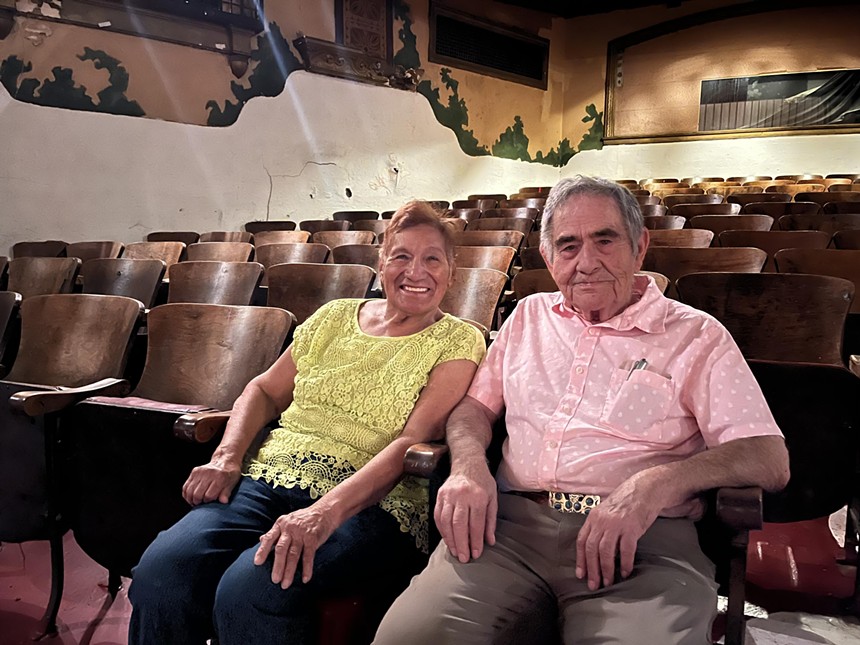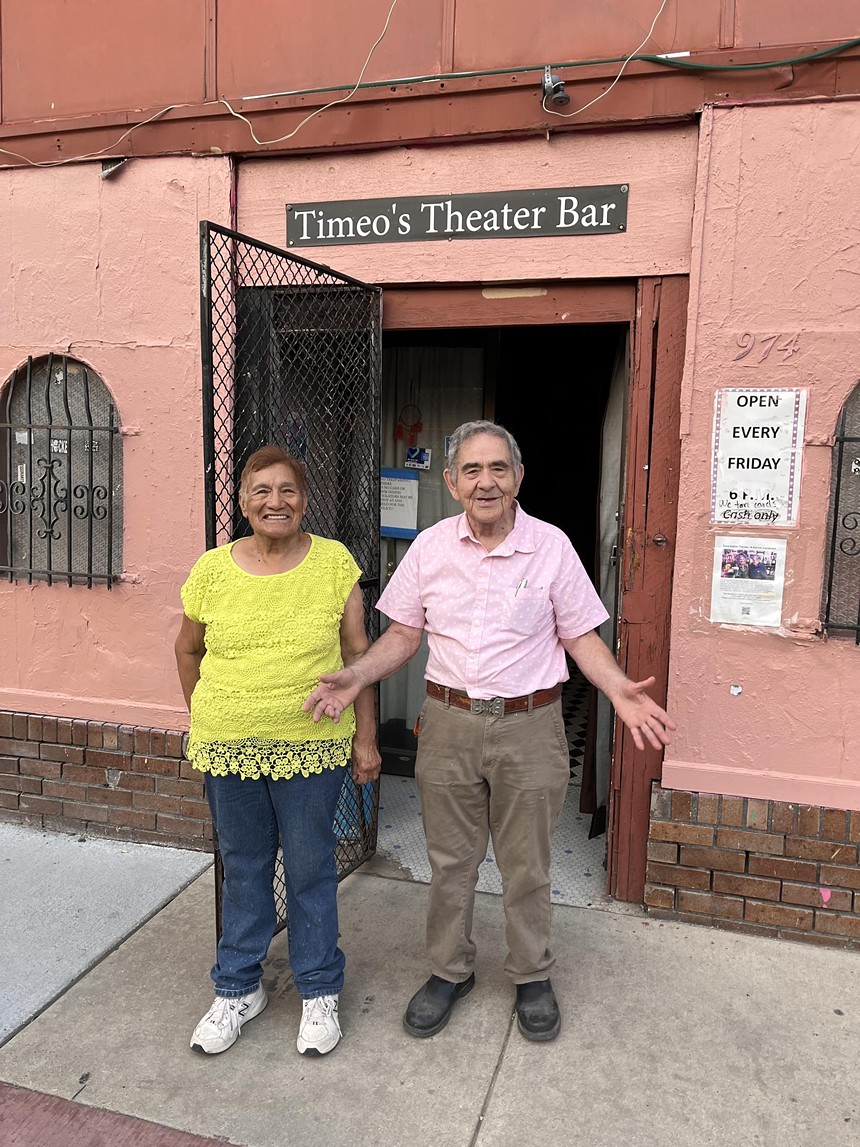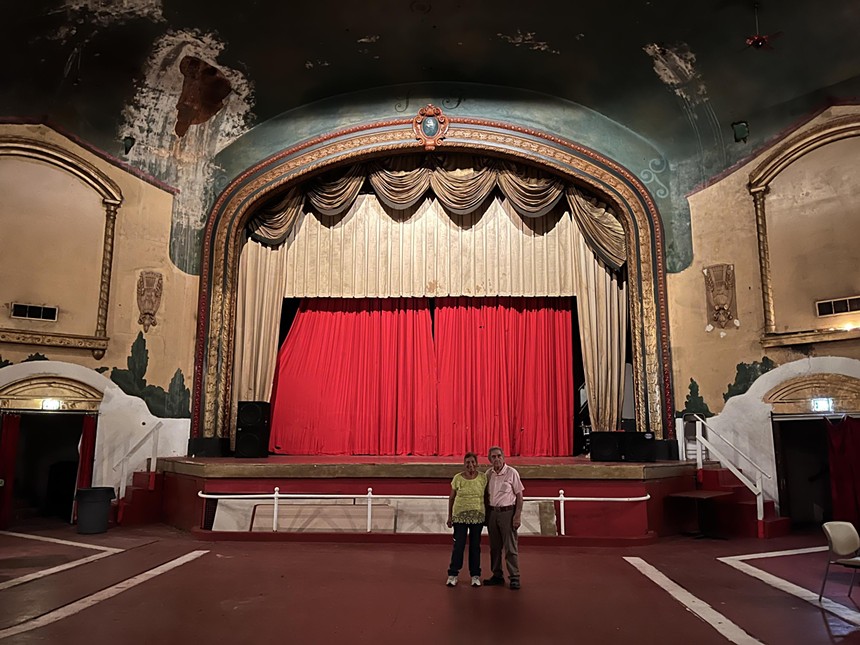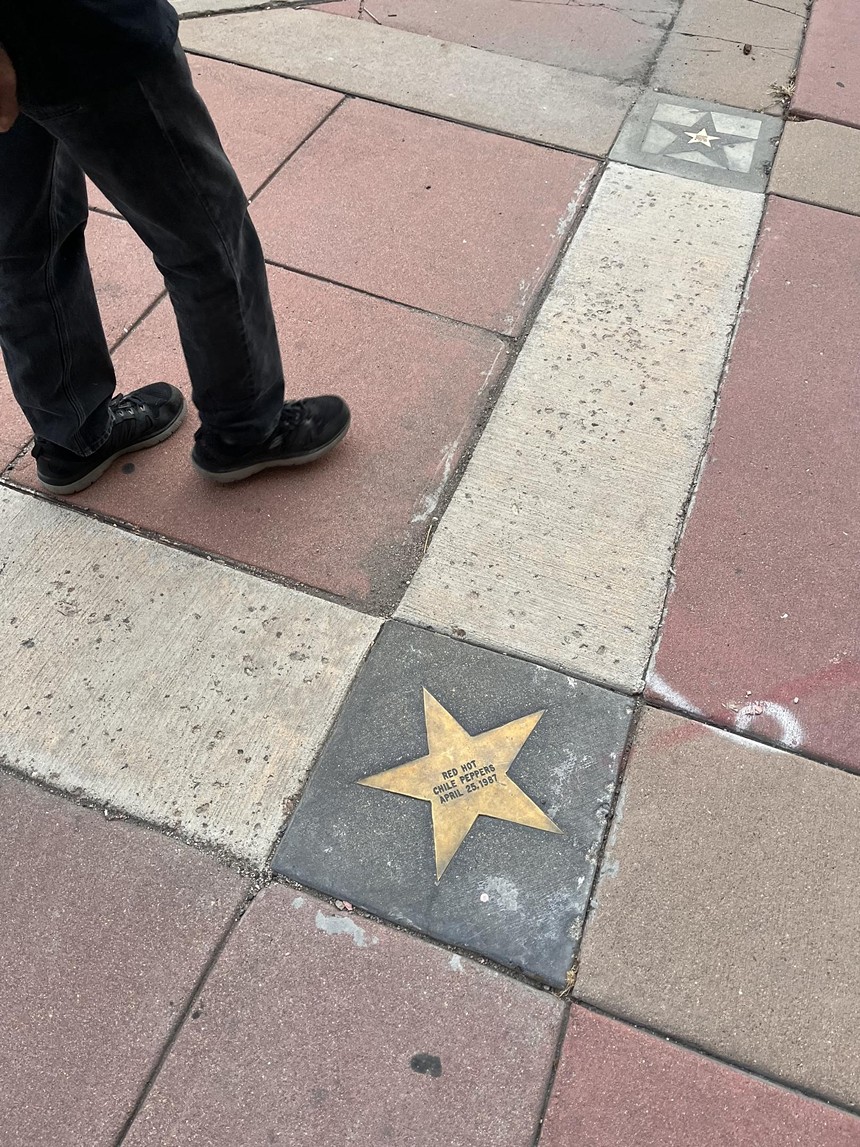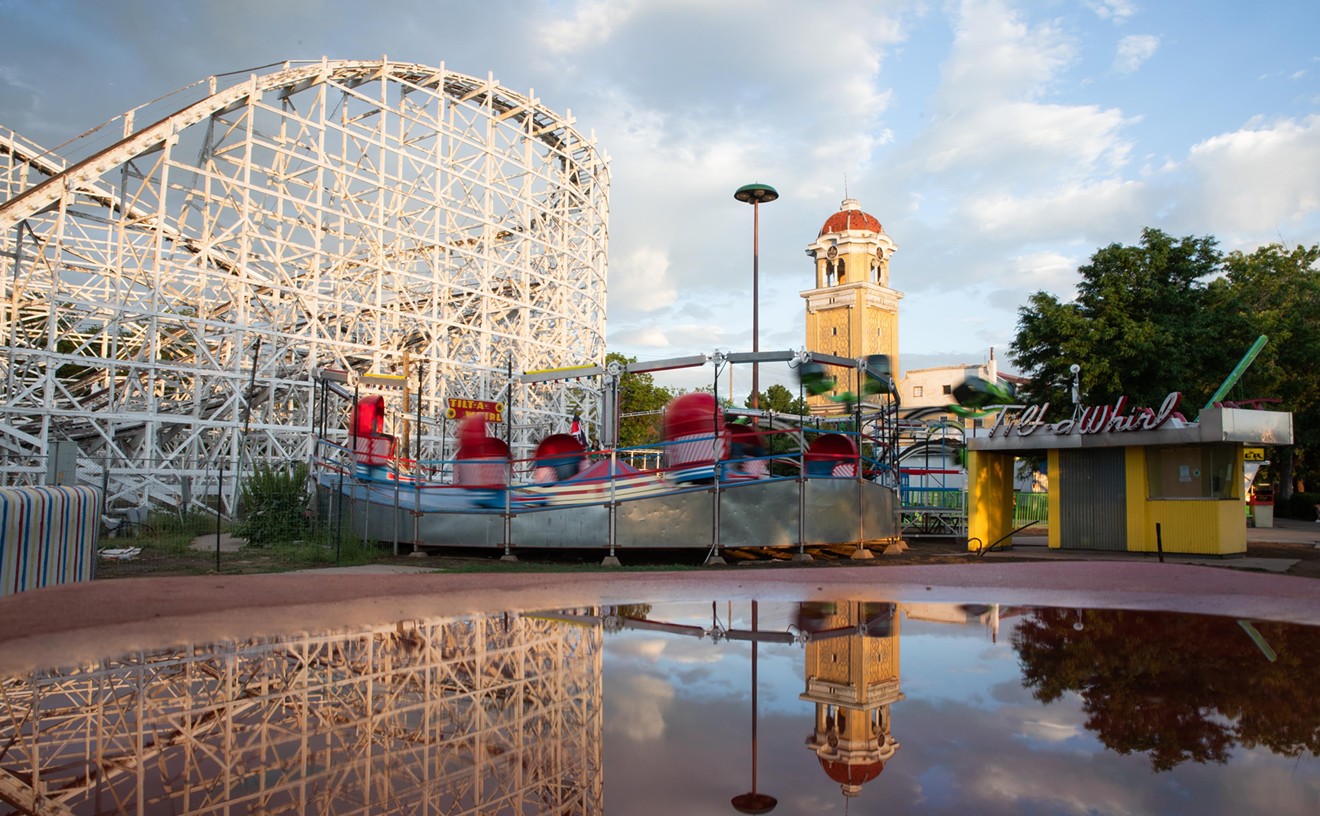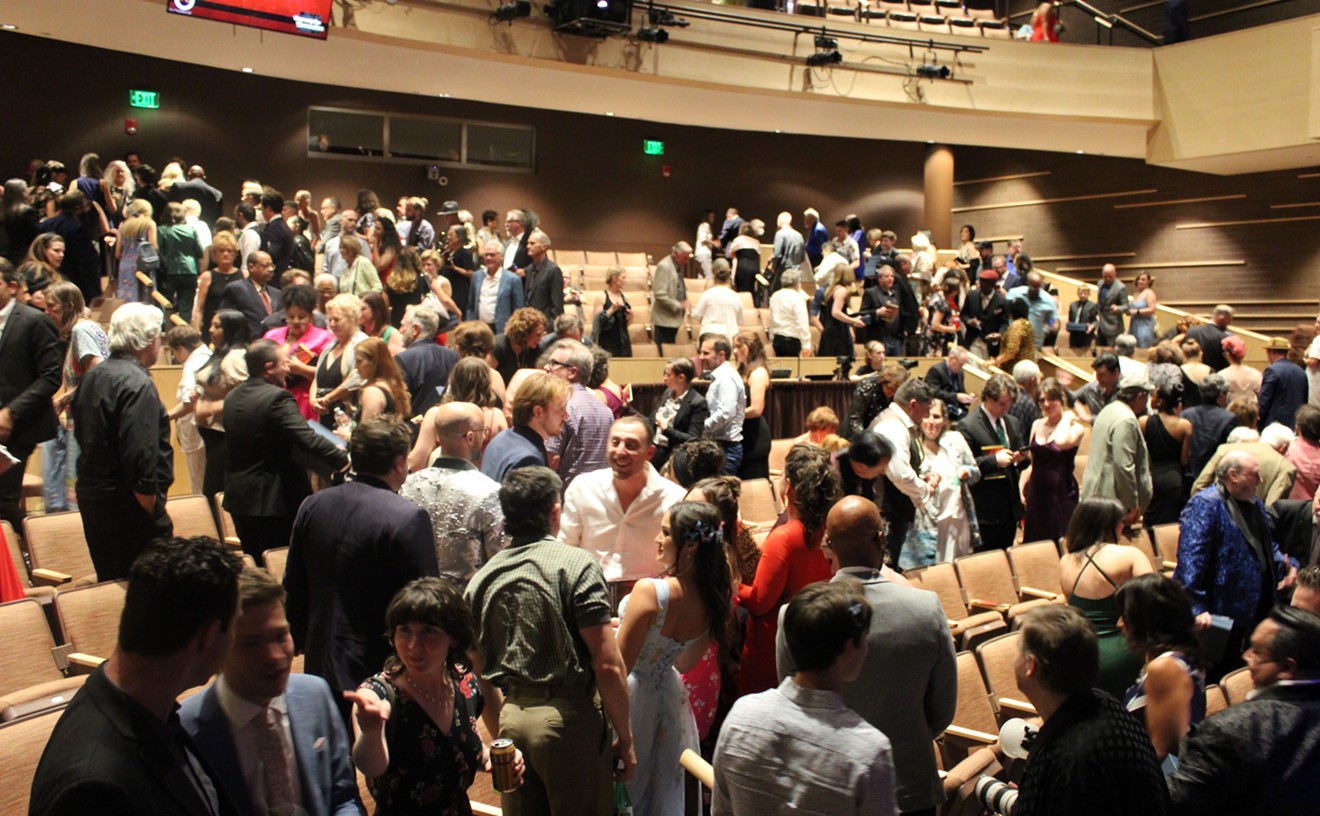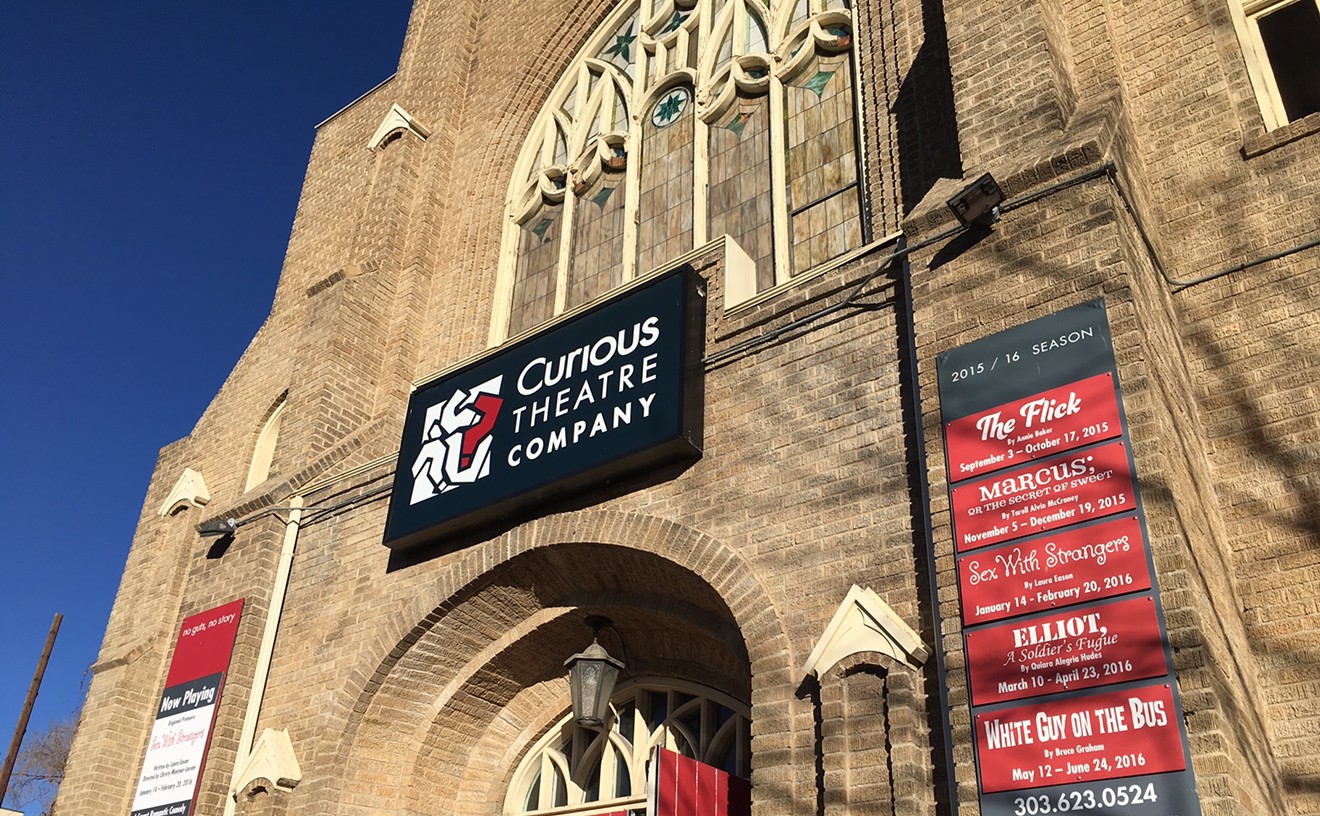Timeo Correa walks through the Aztlan Theatre’s lobby, with its Art Deco paintings peeling from the ceiling and the dilapidated concession stand lingering in the shadows of the foray. Correa steps through a pair of tall swinging doors and into the theater’s main room. Thick folds of royal red velvet curtains flow from the stage’s rafters to the floor. Cast in a bright spotlight and framed in an ornate wooden arch, it is a vision of classic opulence, a timeless setting for theatrical performances since its opening in 1928. But a lot can happen in nearly a hundred years.
“Here’s where the Red Hot Chili Peppers played. On that same stage: AFI, Run DMC, Ludicrous, Fishbone, Selena, Metallica. Back then they were underground bands,” Correa says as he rattles off an unreal list of modern music legends who have performed here since he purchased the building in 1972.
Correa, now in his early eighties, has owned and operated the Aztlan Theatre for half of its hundred-year history. He is the voice of record for its long and, for him, very personal history.
“This is where I spent most of my life,” he reflects. “It just kept me going. It’s half of me, or three-quarters of me, or all of me because I’ve been here so long.”
After a 2023 assessment by the City of Denver declared the property’s value had doubled to over $1.5M, Correa’s annual tax bills subsequently skyrocketed to nearly $40,000. Coupled with a slow bounce-back from COVID-era shutdowns and costly repairs needed for the roof and other aging infrastructure, Correa finds himself in a troubling situation under what he considers a flawed assessment process.
“They don’t consider the way the property looks, the need for renovations, and they don’t take into account the property’s income, which I think they should,” Correa explains. He then strikes a tone of theatrical pronouncement, his voice tinged with feigned solemnity echoing off the empty theater’s walls: “The pendulum swings from the good times to the bad times.” He brings his voice back down and lifts a corner of his mouth into a wry smirk, “Right now it's a bad time.”
In response to Correa’s financial distress, local music promoter Juan Miguel Pinto Diaz has organized a fundraising concert on Saturday, August 3, from 6 p.m. to 2 a.m. The event will feature a diverse lineup of local and national electronic dance music DJs spinning a wide mix of genres that Pinto Diaz says will offer something for everybody. All the proceeds from the $20 cover charge will go directly to Correa, and a GoFundMe page that was set up to support the Aztlan Theatre has also raised over $7,000.
Pinto Diaz, along with friends Rasaaq Shittu and Cyrus Slavin, co-founded Hoppers in 2021, a project that is focused on creating comfortable and inclusive communities through dance parties. The website states that “Hoppers is captivated by reimagining familiar spaces and transforming them into welcoming dance floors where safety, sonic exploration, and visual arts are priority.” Hoppers party-goers are asked to follow these rules: Respect each other, respect the space, and dance.
Pinto Diaz was only introduced to Correa earlier this year, when he and his local DJ colleague Will Baach approached Correa to book a night at the Aztlan. That event didn’t end up happening, but a friendship between Correa and Pinto Diaz grew out of that first meeting. Pinto Diaz grew up between Ecuador and Denver. He and his fellow Hoppers co-founders are all from immigrant American families, and the history of cultural impact that the Aztlan has had, especially on Denver’s Latino community, strongly resonated with the three young promoters and spurred their interest to work with Correa.
“As cities change so much, it becomes more important to grasp onto the places and establishments that in terms of architecture represent the city and what it was before, but also in terms of culture and the different lives that this venue has gone through and the amount of generations it has impacted,” Pinto Diaz says. “This is such a cool venue. It has so much history. It has done so much good. It's our turn to give back and continue throwing [events] here.”
The “Save the Aztlan” event will also include an exhibition of local artists curated in collaboration with the Art District on Santa Fe. Pinto Diaz hopes the party will raise awareness in the dance scene on the virtues of the venue.
“In the electronic scene, you see a lot of underground shows [in Denver]. A lot of people would love to be able to have a venue this big for the price Timeo charges,” Pinto Diaz said, “Most people don’t know about it. And I feel like if they did, it would be like, ‘Fuck yeah, we want to throw things here.’”
Pinto Diaz said this will not be a “one-off event,” but the first of what he hopes is many nights to be booked at the Aztlan, continuing a lineage of live shows that started decades ago when Correa navigated another precarious era in the theater’s history, shifting it from from a film house to a music hall.
Correa bought the Santa Fe Drive theater on his birthday, December 19, 1972. He made a few changes, including renaming it the Aztlan Theatre, and reopened it in January 1973. Unable to secure the rights to major-studio new releases, Correa began screening second-run 35mm movies for the next decade until the dawn of the VCR, which he says nearly killed his movie theater business model. Correa pivoted to screening Spanish-language films for many years while also volunteering the space for voter registration efforts, Christmas food drives and public forums on gang violence. In the mid-1980s, Correa adapted the space for the times again and began booking live bands of all kinds, from techno raves to death metal.
The Aztlan has functioned mainly as a live-music venue ever since. Its jumbled history is documented and displayed in Timeo’s Theater Bar, where vintage Mexican movie posters and punk rock tour fliers from the last century still hang on its walls. But despite his creative adjustments over the years, financial strains continue to haunt the theater and have worsened under the recent property tax hikes.
“It kept me busy, and I tried to make it work, but it kept food on the table through the years. I’d hate to see it go. I’d probably go home and the next day I’d probably come on over here and think I had a key to open the door,” Correa says. “I think we’ve made a lot of changes in the community and have given back to the people.”
Pursuing historical designation for the building requires meeting challenging specifications, and several property developers have said the theater’s lot is not big enough to build on; some of Correa’s family members are urging him to sell the property flat out. Surveying the interior of the theater’s main room, Correa sees its century-old luster washing away in calcified water stains streaking down its walls from cracks in the roof. Pondering the future, Correa feels conflicted as he sees different paths laid before him — none of which he wishes to follow. He hopes the theater will remain an arts and entertainment center and thus remain a testament to his vision.
“I’d like to leave a little legacy,” he says. “I’d like to leave it in the hands of people who want to do the same thing and keep it as a community [place]. We brought a lot of people together. We made people happy. They had a place to come to. We were a part of their lives for a long time. We entertained them. When I grabbed this place, I had that mentality of opening doors and helping out the community.”
And with help from Pinto Diaz and the Hoppers team, Correa hopes this upcoming event will help avoid a potential fate of closing the Aztlan’s doors forever.
Correa says he did not know what to expect when he bought the Santa Fe theater, but he embraced the building and its potential not simply as a business venture, but as an embodiment of his own future and fate. And now, in the face of overwhelming financial strain, he is asking himself the same question today that he did when he first got the keys to the place a half-century ago: “Where am I going to go?”
Save the Aztlan Event, 6 p.m. to 2 a.m. Saturday, August 3, Aztlan Theatre, 976 Santa Fe Drive. Get tickets here.

Audio By Carbonatix
[
{
"name": "Air - MediumRectangle - Inline Content - Mobile Display Size",
"component": "12017618",
"insertPoint": "2",
"requiredCountToDisplay": "2",
"watchElement": ".fdn-content-body",
"astAdList": [
{
"adType": "rectangle",
"displayTargets": "mobile"
}
]
},{
"name": "Editor Picks",
"component": "17242653",
"insertPoint": "4",
"requiredCountToDisplay": "1",
"watchElement": ".fdn-content-body",
"astAdList": [
{
"adType": "rectangle",
"displayTargets": "desktop|tablet"
},{
"adType": "rectangle",
"displayTargets": "desktop|tablet|mobile"
}
]
},{
"name": "Inline Links",
"component": "18838239",
"insertPoint": "8th",
"startingPoint": 8,
"requiredCountToDisplay": "7",
"maxInsertions": 25
},{
"name": "Air - MediumRectangle - Combo - Inline Content",
"component": "17261320",
"insertPoint": "8th",
"startingPoint": 8,
"requiredCountToDisplay": "7",
"maxInsertions": 25,
"watchElement": ".fdn-content-body",
"astAdList": [
{
"adType": "rectangle",
"displayTargets": "desktop|tablet"
},{
"adType": "rectangle",
"displayTargets": "desktop|tablet|mobile"
}
]
},{
"name": "Inline Links",
"component": "18838239",
"insertPoint": "8th",
"startingPoint": 12,
"requiredCountToDisplay": "11",
"maxInsertions": 25
},{
"name": "Air - Leaderboard Tower - Combo - Inline Content",
"component": "17261321",
"insertPoint": "8th",
"startingPoint": 12,
"requiredCountToDisplay": "11",
"maxInsertions": 25,
"watchElement": ".fdn-content-body",
"astAdList": [
{
"adType": "leaderboardInlineContent",
"displayTargets": "desktop|tablet"
},{
"adType": "tower",
"displayTargets": "mobile"
}
]
}
]

